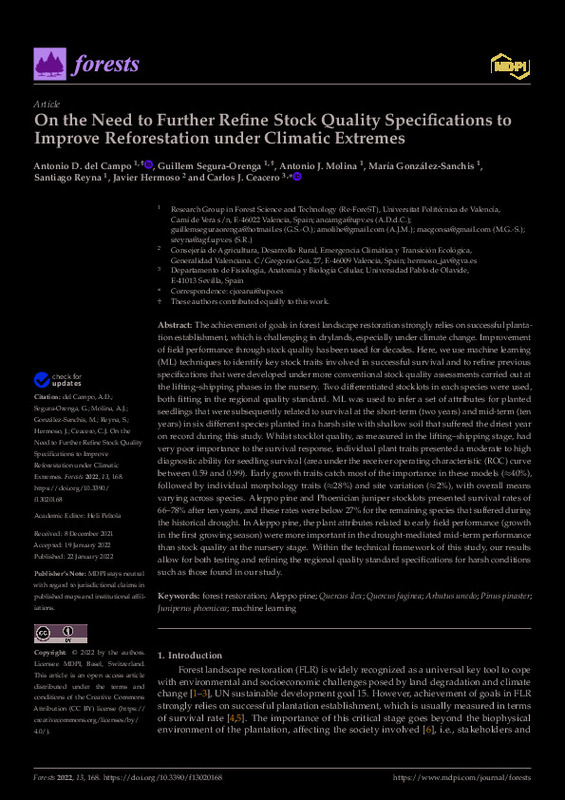JavaScript is disabled for your browser. Some features of this site may not work without it.
Buscar en RiuNet
Listar
Mi cuenta
Estadísticas
Ayuda RiuNet
Admin. UPV
On the Need to Further Refine Stock Quality Specifications to Improve Reforestation under Climatic Extremes
Mostrar el registro sencillo del ítem
Ficheros en el ítem
| dc.contributor.author | Campo García, Antonio Dámaso Del
|
es_ES |
| dc.contributor.author | Segura-Orenga, Guillem
|
es_ES |
| dc.contributor.author | Molina, Antonio J.
|
es_ES |
| dc.contributor.author | González-Sanchis, María
|
es_ES |
| dc.contributor.author | Reyna, Santiago
|
es_ES |
| dc.contributor.author | Hermoso, Javier
|
es_ES |
| dc.contributor.author | Ceacero, Carlos J.
|
es_ES |
| dc.date.accessioned | 2022-12-09T19:00:22Z | |
| dc.date.available | 2022-12-09T19:00:22Z | |
| dc.date.issued | 2022-01-22 | es_ES |
| dc.identifier.uri | http://hdl.handle.net/10251/190533 | |
| dc.description.abstract | [EN] The achievement of goals in forest landscape restoration strongly relies on successful plantation establishment, which is challenging in drylands, especially under climate change. Improvement of field performance through stock quality has been used for decades. Here, we use machine learning (ML) techniques to identify key stock traits involved in successful survival and to refine previous specifications that were developed under more conventional stock quality assessments carried out at the lifting-shipping phases in the nursery. Two differentiated stocklots in each species were used, both fitting in the regional quality standard. ML was used to infer a set of attributes for planted seedlings that were subsequently related to survival at the short-term (two years) and mid-term (ten years) in six different species planted in a harsh site with shallow soil that suffered the driest year on record during this study. Whilst stocklot quality, as measured in the lifting-shipping stage, had very poor importance to the survival response, individual plant traits presented a moderate to high diagnostic ability for seedling survival (area under the receiver operating characteristic (ROC) curve between 0.59 and 0.99). Early growth traits catch most of the importance in these models (approximate to 40%), followed by individual morphology traits (approximate to 28%) and site variation (approximate to 2%), with overall means varying across species. Aleppo pine and Phoenician juniper stocklots presented survival rates of 66-78% after ten years, and these rates were below 27% for the remaining species that suffered during the historical drought. In Aleppo pine, the plant attributes related to early field performance (growth in the first growing season) were more important in the drought-mediated mid-term performance than stock quality at the nursery stage. Within the technical framework of this study, our results allow for both testing and refining the regional quality standard specifications for harsh conditions such as those found in our study. | es_ES |
| dc.description.sponsorship | This study is part of research projects: "Comprehensive quality control of the reforestation works in the public forest of Cortes de Pallas, Valencia" signed between UPV-ReForeST and the state-owned company TRAGSA, and "Monitoring and evaluation of the reforestation in the forest V-143 Muela de Cortes, in the municipality of Cortes de Pallas (Valencia), 10 years after its execution" (contract number CNMY18/0301/26), signed between UPV-ReForeST and Valencia Regional Government (CMAAUV, Generalitat Valenciana). | es_ES |
| dc.language | Inglés | es_ES |
| dc.publisher | MDPI AG | es_ES |
| dc.relation.ispartof | Forests | es_ES |
| dc.rights | Reconocimiento (by) | es_ES |
| dc.subject | Forest restoration | es_ES |
| dc.subject | Aleppo pine | es_ES |
| dc.subject | Quercus ilex | es_ES |
| dc.subject | Quercus faginea | es_ES |
| dc.subject | Arbutus unedo | es_ES |
| dc.subject | Pinus pinaster | es_ES |
| dc.subject | Juniperus phoenicea | es_ES |
| dc.subject | Machine learning | es_ES |
| dc.subject.classification | TECNOLOGIA DEL MEDIO AMBIENTE | es_ES |
| dc.subject.classification | INGENIERIA HIDRAULICA | es_ES |
| dc.title | On the Need to Further Refine Stock Quality Specifications to Improve Reforestation under Climatic Extremes | es_ES |
| dc.type | Artículo | es_ES |
| dc.identifier.doi | 10.3390/f13020168 | es_ES |
| dc.relation.projectID | info:eu-repo/grantAgreement/UPV//CNMY18%2F0301%2F26/ | es_ES |
| dc.rights.accessRights | Abierto | es_ES |
| dc.contributor.affiliation | Universitat Politècnica de València. Escuela Técnica Superior de Ingeniería Agronómica y del Medio Natural - Escola Tècnica Superior d'Enginyeria Agronòmica i del Medi Natural | es_ES |
| dc.description.bibliographicCitation | Campo García, ADD.; Segura-Orenga, G.; Molina, AJ.; González-Sanchis, M.; Reyna, S.; Hermoso, J.; Ceacero, CJ. (2022). On the Need to Further Refine Stock Quality Specifications to Improve Reforestation under Climatic Extremes. Forests. 13(2):1-20. https://doi.org/10.3390/f13020168 | es_ES |
| dc.description.accrualMethod | S | es_ES |
| dc.relation.publisherversion | https://doi.org/10.3390/f13020168 | es_ES |
| dc.description.upvformatpinicio | 1 | es_ES |
| dc.description.upvformatpfin | 20 | es_ES |
| dc.type.version | info:eu-repo/semantics/publishedVersion | es_ES |
| dc.description.volume | 13 | es_ES |
| dc.description.issue | 2 | es_ES |
| dc.identifier.eissn | 1999-4907 | es_ES |
| dc.relation.pasarela | S\468523 | es_ES |
| dc.contributor.funder | Universitat Politècnica de València | es_ES |
| upv.costeAPC | 1136,16 | es_ES |








